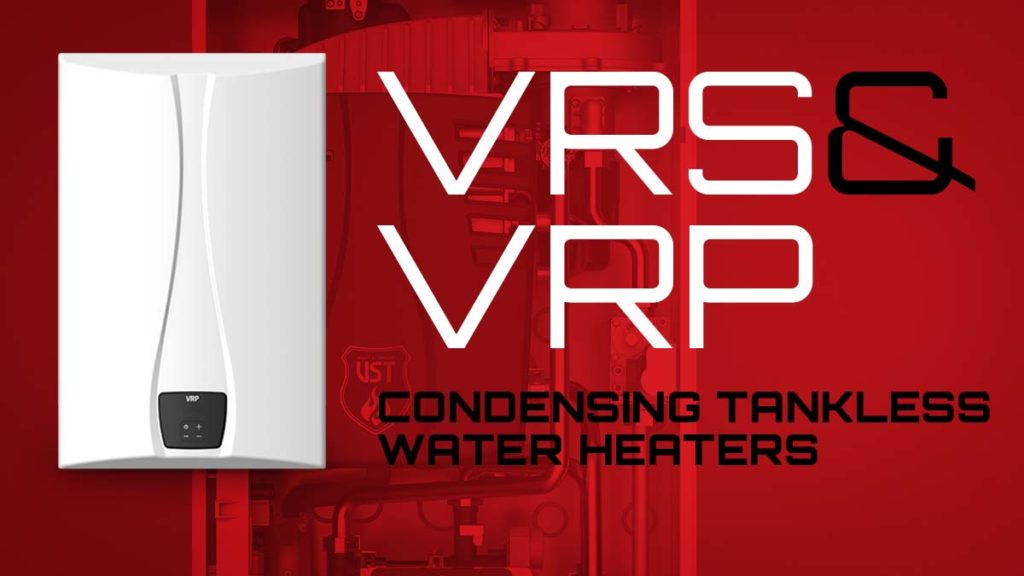Tankless water heater technology has come a long way since its invention in 1929. Due to technological improvements, condensing tankless water heaters now offer homeowners and businesses efficient performance, energy savings, and a consistent source of hot water.
Introducing Vesta.DS, Inc.™
Vesta.DS, Inc. is a US-based brand of high-efficiency tankless water heaters owned and manufactured by its parent company Daesung Celtic™ in South Korea. They provide the North American market with:
- Tankless water heaters
- Hybrid water heaters
- Combination boilers
- Heating boilers
- Cascading tankless water heaters
- Accessories
This article will explore their VRS and VRP Condensing Tankless Water Heaters, discuss their features and benefits, and look under the hood to see what makes them tick.
VRS & VRP Condensing Tankless Water Heaters: Overview

VRS & VRP: Features & Benefits
| Features | Benefits |
|---|---|
| All Stainless Steel Heat Exchanger | Longevity |
| Grundfos Pumps | Reliability + Proven Performance |
| Easy Diagnostics | Easy to control and service |
| Self-Calibration | Easy Setup. Maximum Efficiency |
| 10:1 Turndown ratio | Efficient Performance + Energy Savings |
| Easy to adjust temperatures | Control and comfort |
| Compact Size | Space savings in utility room |
| Quiet operation | Distraction-free environment |
| Safety Features | Peace of mind. Safe, reliable performance. |
| Exceptional Warranty | Peace of mind + Protection |
| 4 recirculation mode (VRP) | Instant hot water on demand |
| 1/2 Gal Buffer Tank (VRP) | Instant hot water on demand |
VRS vs. VRP: What’s the Main Difference?
Both the VRS and VRP are Condensing Tankless Water Heaters. The main difference is the recirculation pump capability that the VRP series affords. Recirculation pumps are beneficial because they keep hot water circulating near the tap, eliminate any “cold water sandwich” effect, and help increase efficiency.
As you can see in the image below, the bottom of the VRP includes one extra port for a return line be connected. Additionally, the VRP does have an internal recirculation mode if you don’t have an external recirc line.

Under the Hood: VRS & VRP Explored

1. Heat Exchanger
The primary heat exchanger is a fin and tube design, and the secondary heat exchanger is a plate-to-plate type. They work together to provide highly efficient combustion for max energy savings.
The primary and secondary heat exchangers are pure, high-quality 304-type stainless steel. In fact, you can test it with a magnet: if you hold one up to the heat exchanger, you’ll find that it won’t stick, ensuring it’s completely stainless steel (you’ll find this isn’t true with other popular brands that use metal alloys in their heat exchangers).
Additionally, the heat exchangers are robotically welded, with as few welding points as possible, ensuring structural integrity and a long lifespan.
2. Burner
The Bekaert™ burner on top of the heat exchanger (in the burner hood) is engineered for SCAQMD Compliant Low NOx emissions. There is a sight-glass in the front so you can check the health of your flame at any time.
3. Igniter and Flame Rods
Ignitor rods and flame rods are easily accessible for inspection. Simply remove a single screw on the heat exchanger cover to access.
4. Dual Purpose Turbo Fan Assembly
The Dual Purpose Turbo Fan Assembly draws in air and gas for combustion. Furthermore, it has a self-calibration mode that sets adjusts its RPMs based on your environment, so you achieve the proper air-to-gas ratio wherever you’re located.
5. Gas Valve
The Vesta’s gas valve is a simple negative pressure gas valve. No adjustments are needed due to Vesta’s unique Self-Calibration abilities.
6. Mixing Valve
The water coming directly out of your heater may be higher than the set-point of your tankless water heater. The mixing valves must constantly modulate and insert necessary cold water to ensure that water exits the unit at the set temperature.
7. Flow Sensor
The flow sensor’s job is to detect and measure the water flow rate. As water passes over an internal turbine, the data is captured and sent to the control board.
8. Flow Control Valve
The flow control valve senses and controls water flow in the unit. It modulates open or closed according to temperature.
If too much water runs through the system, the valve will slow the rate to ensure water reaches the proper temperature before exiting the water heater. Water temperature always takes priority over the flow rate.
Essentially, this will prevent lukewarm water from exiting your hot water tap if the unit is being overdrawn (when filling a bathtub, for example).
9. Condensate Trap
The Condensate Trap collects condensation which is formed during combustion. This condensation is highly acidic and flows to a floor drain or is pumped from your system.
10. Control Board
The Control Board strategically resides on the lower-left side of the unit – away from water piping. Additionally, it has an Epoxy Coating to protect it from any possible water damage.
The Control Board controls and communicates with each component to ensure smooth and efficient operation.
11. Buffer Tank (VRP only)
The VRP’s buffer tank holds a 1/2 gallon of hot water to eliminate the “cold water sandwich” effect that other tankless water heaters may experience.
The buffer tank consists of high-grade 304 stainless steel for durability. It has a dip tube with diverter holes, creating a natural turbulent flush for the system; any time it runs, it cleans itself.
12. Recirculation Pump (VRP only)
Vesta units use s Grundfos 15-58 Recirculation Pump. This pump’s job is to circulate the water in standby to prevent freezing, whether in Internal or External Recirculation mode.
This three-speed pump is a well-known, quality pump that boasts a tried-and-true performance in the field.
Safety Devices: Thermistors
There are four thermistors (temperature sensors) monitoring every VRS or VRP, measuring the following:
- Cold Water Inlet Temperature
- Heat Exchanger Temperature
- Hot Water outlet Temperature
- Exhaust Temperature
Note: should your heater exchanger and burner get too hot, it is most likely due to lime or calcium build-up in your system, and flushing is needed ASAP.
Lime Alarm
The Vesta Tankless Water heaters have a feature that reminds you when it is time for annual descaling. Users can set this reminder for 6, 12, or 24 months.
Conclusion
By design, VestaDS, Inc. VRS and VRP Condensing Tankless Water Heaters provide maximum comfort and energy savings.
Every component of these machines was considered carefully to provide users with the best value.
Vesta is so confident in the integrity of their design and the quality of their product that they stand behind it with a full 15-year warranty — the best the industry offers.
Users of the VRP and VRS can expect a reliable, hard-working product guaranteed to deliver on its promise to provide comfort and energy savings.
Don’t hesitate to contact us if you want to learn more about Vesta Tankless Water Heaters or try one in your home or business.
Special thanks to Thomas Murrell, Technical Trainer & Service Support at Vesta.DS, Inc., for his contributions.

